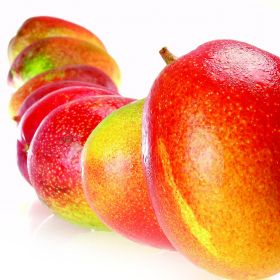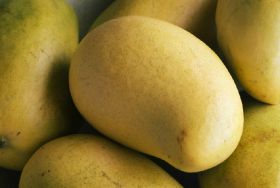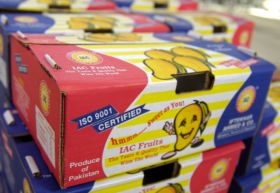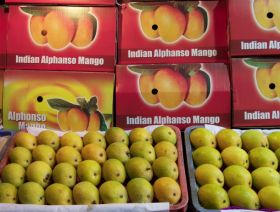Mango

Senegalese organic mango producer EcoPeace has launched its fourth UK campaign with a community-focused sampling programme and distribution to local markets.
The company, established using an ethical socio-economic model, supplies into the UK from June until August, and had sold over 100 boxes to the UK by the start of July. On average the company produces between 15 to20 tonnes of mangoes a year.
A 6kg box is currently retailing at £27, while mango jam or chutney is available for £4.50 per jar.
Grown on a farm in Pout, near Senegal’s capital of Dakar, EcoPeace mangoes include Kent, Smith and Baguinda varieties, which are certified organic according to GlobalGAP standards.
The company was founded in 2006 by Sheikh Aly N’Daw, head of NGO International Sufi School, and stared with the acquisition of 10 hectares of land in the village of Bayouf Pout, Senegal.
Its employees are on the whole local women and young people, who are evolving the fruit and vegetable processing unit where beverages, cordials, pickles and jams are produced by hand. The company also produces a range of premium herbal teas, dietary supplements and syrups, made with traditional plants and fruits from Senegal.
A shipment of the fruit has been rejected in the Netherlands due to the presence of fruit fly

An airfreighted consignment of mangoes from Pakistan has been turned away in Amsterdam after the presence of fruit fly was discovered by inspectors.
The rejection of the mangoes marks the first time this season that any volumes of the fruit from Pakistan has been rejected by the EU, the Express Tribune reported.
“This is the first rejection of any mango consignment this season,” explained Dr Mubarak Ahmed, director general of Pakistan’s Department of Plant Protection. “We have further tightened up the clearance measures to control the situation.”
Prior to last week’s discovery, which was made in a 4.5 tonne consignment of the fruit, Pakistan has exported some 26,000 tonnes of mangoes to the European Union so far this export campaign.
Retailer lists ‘first-ever’ Bangladeshi mangoes exported to mainstream European markets
Asda will this week receive the first delivery of Bangladeshi mangoes to the UK in a move that signals the start of the country’s access to mainstream international retailers.

The news comes following field visits and sample shipments of nine mango varieties during last year’s season, Bangladeshi local paper The Dhaka Tribune reported. Asda’s buying arm IPL then selected three mango varieties, Himsagar, Langra and BARI Aam-3 (Amrupalli), to import during the 2015 season, the paper said.
A spokeperson for Asda said: “We are due a delivery of the Himsagar variety mangoes from Bangladesh this week and they’ll be available in 10 stores.”
Vice chairman of Bangladesh’s Export Promotion Bureau (EPB), Shubhashish Bose, told The Dhaka Tribune: “The mango exports to UK will open the door of earning foreign currencies and will also help the government to start for product diversification.”
Mike Robson, representative of the Food and Agriculture Organisation (FAO) to Bangladesh, said: “I am really excited to say that mangoes from Bangladesh have market access to UK, meaning it will open a gateway for other supermarkets in Europe.”
Over 150 farmers across the three districts of Satkhira, Chapainawabganj and Rajshahi have now been registered to supply mangoes, the Dhaka Tribune said.
Pakistan’s projections of mango exports are set to stay largely unchanged from previous years, despite the EU ban on Indian mangoes

Pakistan’s mango exports are forecast to be valued at US$65m by the end of the season, only slightly higher than last year’s US$60m, said the Pakistan Fruit and Vegetable Exporters, Importers and Merchants Association (PFVA) in a statement released this week, according to the Express Tribune.
Despite the EU ban on Indian imports, the PFVA is not forecasted growth for its own mango exports, with the season due to begin 25 May. PFVA spokesman Waheed Ahmed told the Tribune that mango production would drop to 1.45m tonnes, from 1.85m tonnes in 2013, due to poor weather conditions hitting the country’s key mango producing regions.
Pakistan will now focus on quality not quantity of produce, said Ahmed, and would be looking to export to potential new markets of South Korea and Australia, and will continue trade with Europe, where it currently ships 24,000 mangoes annually.
Exports are still closed to the US and Japan, along with a severed trade agreement with Iran following US international sanctions, costing Pakistan US$10 in mango exports annually.
More trees reaching full maturity and a benign winter were the main reasons for the rise in output during 2013/14

Peru exported 140,000 tonnes of mangoes during the 2013/14 campaign, a 40% increase on the 105,000 tonnes shipped last season according to the latest figures from exporter association Apem.
The association’s general manager Juan Carlos Rivera said the rise was due to favourable climatic conditions during the winter and more plantations reaching full productivity, among other factors. “Also there were no rains during harvesting, which meant the fruit could go on being harvested almost to the end of the season,” he said.
Meanwhile, Angel Gamarra, president of Promango, said 2013/14 had been one of the best seasons in recent years, with 22,000ha planted between Piura and Casma. Piura accounts for around 75% of Peru’s mango output, followed by Lambayeque with 15% and Ancash with 10%.
The leading destination for Peruvian mangoes is the Netherlands (40%), followed by the US (36%), the UK (10%) and Canada (5%).
UK Prime Minister David Cameron to discuss the EU ban on mango imports with the newly elected Indian prime minister, to be announced May 16

Since May 1st, the EU has blocked all imports of Indian mangoes, eggplant, taro plant and two types of gourd until December 2015. The European Commission announced the ban following authorities in Brussels found Indian shipments of fresh produce contaminated with fruit flies last year.
British MPs including Jon Ashworth and Keith Vaz have criticised the ban for the run-on effects to local retailers, importers and distributors as well as Indian farmers. A petition with over 2000 signatures has also been circulated, opposing the ban.
Speaking during Prime Minister’s Questions, Cameron said, “The European Union has to look on the basis of the science and the evidence and there are concerns about particular cross contamination in term of British crops and British interests.
“But I understand how strongly [Mr Vaz] feels and how strongly the Indian community in this country feels and indeed I look forward to discussing it with the new Indian prime minister.”
The Indian mango season lasts from mid-April to early July. With the ban coming in just as exporters were gearing up for the season, and UK imports of Indian mangoes valued at £6.3m (US$10.68m), prices of mangoes within India have now decreased significantly.